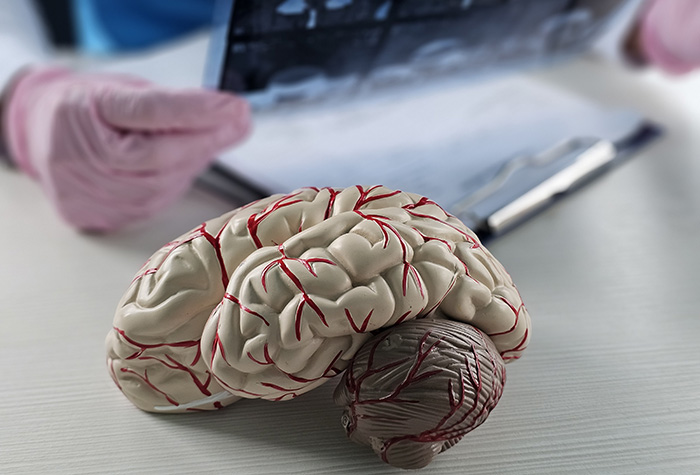Office of Research & Development |
 |


New VA research protects the blood-brain barrier to prevent cognitive decline from traumatic brain injury and Alzheimer's. ©iStock/Nadzeya Haroshka
June 20, 2025
By Marcus Henry
VA Research Communications
"People think inflammation is a bystander to the amyloid. It turns out it is not the bystander. It is the author of the story."
VA researchers have developed a drug that inhibits the enzyme regulating tissue growth, which leads to damaged tissues repairing themselves more effectively, even damaged brain tissue caused by traumatic brain injuries or neurodegenerative diseases like Alzheimer’s.
For more than a decade, VA researcher Dr. Andrew A. Pieper and his collaborator Dr. Sanford Markowitz have been working on this discovery. It all began, unexpectedly, with colon cancer research.
“We found that when we eliminated 15-PGDH in animals, they were totally resistant to colitis (an inflammation of the colon’s inner lining) because they could grow new cells as fast as the old ones were being lost,” Markowitz said.
This finding led to the development of a drug called SW033291, designed to inhibit 15-PGDH with high selectivity. The drug showed promise in peripheral tissues, and that is when Dr. Pieper, a VA psychiatrist and neuroscientist specializing in neurodegeneration, entered the picture.
Together, Pieper and Markowitz asked the bold question of whether this same approach could help repair the brain, offering hope to the multitude of Veterans living with traumatic brain injury and those at risk for dementia. They discovered that 15-PGDH expression was especially highly enriched in inflammatory cells localized to the blood-brain barrier, the specialized interface between the peripheral blood vascular system and the brain that regulates brain health and blood supply across the lifespan.
What followed was groundbreaking. In preclinical studies using mouse models of both traumatic brain injury and Alzheimer’s, inhibiting 15-PGDH turned off inflammation and protected the blood-brain barrier from exhibiting the deterioration that normally occurs in these conditions.
“When we were able to prevent the blood-brain barrier from breaking down, we were able to prevent neuroinflammation and neurodegeneration in the brain, which completely protected the animals from cognitive impairment in both traumatic brain injury and Alzheimer’s disease,” Pieper said.
Traumatic brain injury remains one of the most common and complex injuries sustained in military service. The effects can linger for years after the injury, contributing to cognitive problems and increasing the risk of dementia.
“TBI is the third leading risk factor for developing Alzheimer’s disease, behind aging and genetics,” Pieper said. “That is part of the reason Veterans are at such higher risk for dementia.”
What makes this discovery particularly exciting is that it offers a paradigm-shifting path forward. The primary focus of Alzheimer’s drugs today is to target amyloid plaques, but this approach addresses inflammation and blood-brain barrier dysfunction directly. In fact, the only symptom of Alzheimer’s left in the mice treated by 15-PGDH inhibition was the accumulation of amyloid plaque.
“People think inflammation is a bystander to the amyloid. It turns out it is not the bystander. It is the author of the story,” Markowitz said.
While human clinical trials are still ahead, both researchers remain driven by a sense of mission. Their work, conducted at the VA and in partnership with Case Western Reserve University and University Hospitals, stands as a powerful example of VA Research and Development’s ongoing commitment to Veterans.
“We are trying to solve problems that are important to everybody,” Pieper said. “Researchers all over the world are working hard to find innovative solutions to these types of major problems in brain health facing society today, many of which are currently completely untreatable. With dedicated scientific effort, we can find solutions that will help patients.”
“We would not have devoted over a decade of blood, sweat, and tears in our laboratories to this effort if we didn’t think we would have the opportunity to help people,” Markowitz added.
VA Research Currents archives || Sign up for VA Research updates